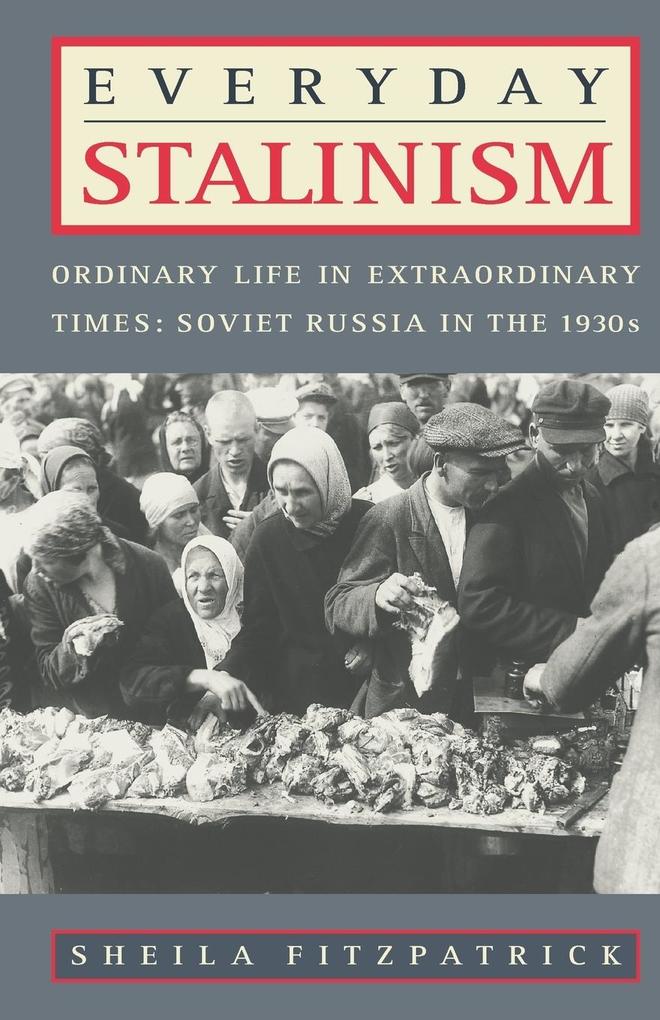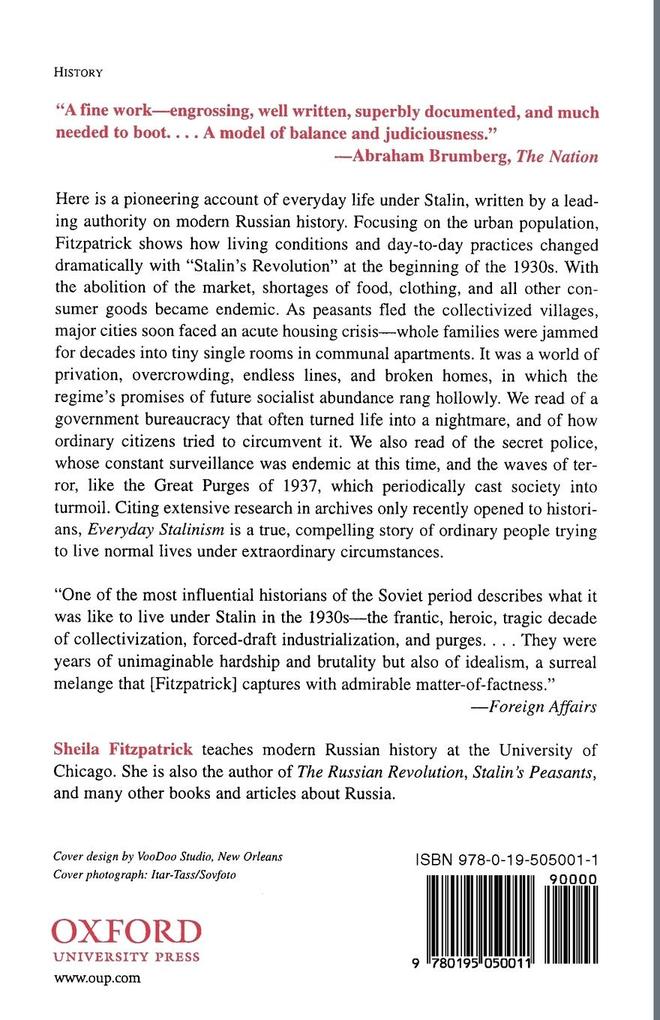NEU: Das eBook.de Hörbuch Abo - jederzeit, überall, für nur 7,95 € monatlich!
Jetzt entdecken
mehr erfahren
Zustellung: Sa, 06.09. - Mi, 10.09.
Versand in 5 Tagen
VersandkostenfreiDrawing on research from newly opened Soviet archives, a leading authority on modern Russian history shows how living conditions and day-to-day practices changed dramatically in Soviet Russia with Stalin's revolution of the 1930s--forcing ordinary people to live under extraordinary circumstances. 5 halftones. 5 illustrations.
Inhaltsverzeichnis
- Acknowledgments
- Introduction
- 1: "The Party Is Always Right"
- 2: Hard Times
- 3: Palaces on Monday
- 4: The Magic Tablecloth
- 5: Insulted and Injured
- 6: Family Problems
- 7: Conversations and Listeners
- 8: A Time of Troubles
- Conclusion
- Notes
- Bibliography
- Index
Produktdetails
Erscheinungsdatum
01. Mai 2000
Sprache
englisch
Untertitel
Ordinary Life in Extraordinary Times: Soviet Russia in the 1930s.
Sprache: Englisch.
Seitenanzahl
310
Autor/Autorin
Sheila Fitzpatrick
Verlag/Hersteller
Produktart
kartoniert
Gewicht
440 g
Größe (L/B/H)
216/140/19 mm
ISBN
9780195050011
Entdecken Sie mehr
Pressestimmen
"Fitzpatrick makes subtle use of the press and of police reports that assist in giving us one of the most comprehensive accounts of what it meant to live in Stalin's Russia in the 1930s."--Kirkus Reviews
"A fine work--engrossing, well written, superbly documented, and much needed to boot....[The book's sources] make absolutely fascinating reading....An assiduous scholar, Professor Fitzpatrick seems to have scrutinized every relevant scrap of paper. Her explication is a model of balance and judiciousness....Individual memoirs apart, most histories of this period were written from the top--that is, showing how the policies were shaped and implemented, rather than how they were perceived and experienced by their subjects. It is the latter...that constitutes the major distinction of Fitzpatrick's book."--Abraham Brumberg, The Nation
[On STALIN'S PEASANTS: ] "[This] monumental study of Russian peasants' responses to collectivization and its immediate aftermath reaffirms Fitzpatrick's status as the leading social historian of the early Soviet period and ensconces her firmly among the ranks of the leading scholars of peasant societies around the world. Painstakingly researched, Everyday Stalinism begins to fill an enormous gap in the historiography of collectivization in the Soviet Union....Peasant voices are finally heard in Fitzpatrick's thick descriptions....[This] book will stand as a solid pioneering effort and a must-read for scholars and students of Russia, the Soviet Union, and other peasant societies."--The Journal of Modern History
"The author's rich materials challenge readers to build their own model of Stalin's people, their complicity and resistance."--Wilson Quarterly
"A fine work--engrossing, well written, superbly documented, and much needed to boot....[The book's sources] make absolutely fascinating reading....An assiduous scholar, Professor Fitzpatrick seems to have scrutinized every relevant scrap of paper. Her explication is a model of balance and judiciousness....Individual memoirs apart, most histories of this period were written from the top--that is, showing how the policies were shaped and implemented, rather than how they were perceived and experienced by their subjects. It is the latter...that constitutes the major distinction of Fitzpatrick's book."--Abraham Brumberg, The Nation
[On STALIN'S PEASANTS: ] "[This] monumental study of Russian peasants' responses to collectivization and its immediate aftermath reaffirms Fitzpatrick's status as the leading social historian of the early Soviet period and ensconces her firmly among the ranks of the leading scholars of peasant societies around the world. Painstakingly researched, Everyday Stalinism begins to fill an enormous gap in the historiography of collectivization in the Soviet Union....Peasant voices are finally heard in Fitzpatrick's thick descriptions....[This] book will stand as a solid pioneering effort and a must-read for scholars and students of Russia, the Soviet Union, and other peasant societies."--The Journal of Modern History
"The author's rich materials challenge readers to build their own model of Stalin's people, their complicity and resistance."--Wilson Quarterly
Bewertungen
0 Bewertungen
Es wurden noch keine Bewertungen abgegeben. Schreiben Sie die erste Bewertung zu "Everyday Stalinism" und helfen Sie damit anderen bei der Kaufentscheidung.









